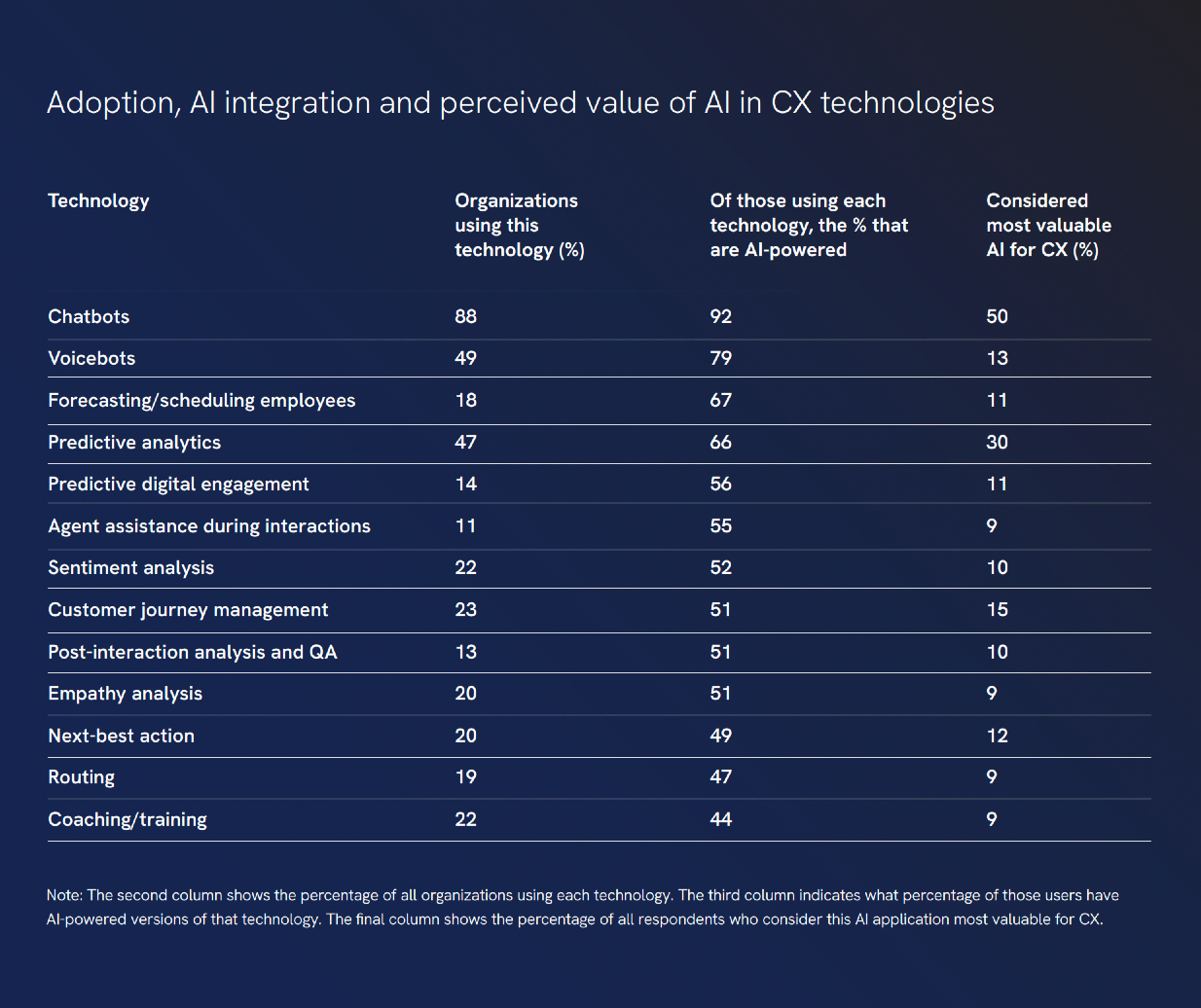Your Genesys Blog Subscription has been confirmed!
Please add genesys@email.genesys.com to your safe sender list to ensure you receive the weekly blog notifications.
Subscribe to our free newsletter and get blog updates in your inbox
Don't Show This Again.

It’s been impossible to escape AI the past two years. It might seem like there’s an AI solution to every business problem, and customer experience (CX) professionals may be concerned that they’ve fallen behind the technology curve. According to a new Genesys survey of over 1,000 global CX leaders, there’s still time to adopt AI. But the time for action is now.
One of the most telling findings from the report is that while some CX technologies are widely used, the industry has far to go toward fully adopting technology — whether it’s powered by AI or not — to improve both the customer and employee experience.
Let’s look at a few of the most prevalent CX technologies and how adopting AI-powered versions of them can catapult your organization forward.
In our research, we asked respondents which CX technologies they currently use. The clear winner was chatbots, with 88% of CX leaders saying they use this self-service tool. This isn’t overly surprising given the relative sophistication of bots and an ongoing desire on the part of both customers and organizations to for robust self-service.
What was perhaps somewhat surprising is that of the chatbots in use, a whopping 92% of them are AI-powered. This shows that these tools have made significant inroads into customer experience strategies, even before the advent of generative AI took the world by storm. Chatbots also topped the list when we asked people to rank CX technologies by how valuable AI versions would be to their organizations.

For instance, voicebots can understand not just responses to simple prompts and offer predefined flows, but also formulate complex answers to queries in real time, enhancing self-service and customer satisfaction.
Customer journey management tools that leverage artificial intelligence can provide real-time insights and predict next-best actions based on customer behavior, making the overall journey smoother and more personalized. Similarly, AI-powered sentiment analysis doesn’t just gauge basic customer feedback — it can dive deeper, analyzing tone, emotion and context to offer a more comprehensive understanding of customer sentiment. It can also surface areas for improvement in the customer journey and in agent coaching.
With only 23% of leaders leveraging customer journey management, and even fewer using advanced tools like sentiment analysis (22%), empathy analysis (20%) or AI-driven agent assistance (11%), CX teams have significant opportunities to improve both customer and employee experiences.
One promise of artificial intelligence is that it will transform customer interactions by making them more personalized and proactive. Customers overwhelmingly see the value in personalization, and our research shows that 76% of CX leaders are using or piloting AI technology to personalize experiences.
Whether it’s offering tailored product suggestions or resolving issues before customers even raise them, AI enables businesses to stay ahead of customer needs. This proactive approach not only enhances customer satisfaction, but it also increases loyalty and lifetime value — 59% of CX leaders in the study predict AI adoption will result in increased customer loyalty.
While traditional CX tools can deliver these benefits, adopting AI-powered versions magnifies the impact, taking personalization to new heights by analyzing vast amounts of customer data in real time.
AI isn’t just transforming customer interactions; it’s also reshaping the employee experience. As AI takes on more common customer service tasks, agents will increasingly be called upon to handle more complex, nuanced and potentially emotionally charged interactions.
Our research found that leaders expect that the importance of agents possessing empathy and compassion, industry and product knowledge, and problem-solving skills will dramatically increase over the next five years.
To help employees meet these expectations, CX organizations can look to AI to offload repetitive tasks. For example, auto-summarization can summarize interactions, and provide wrap-up codes, freeing up valuable time and ensuring that every interaction has high-quality notes.
When employees have more time to focus on problem solving and delivering a more empathetic customer service experience, they tend to be more engaged at work. And more than 66% of CX leaders believe that adopting AI will lead to this. When employees are freed from monotonous tasks, they can focus on problem-solving and delivering a more empathetic customer service experience.
Beyond removing rote tasks, AI-powered CX solutions can also assist agents with growing in their careers. Sentiment and empathy analysis tools can analyze interactions to identify coaching areas, providing continuous feedback for agents. The same tools allow supervisors to build personalized coaching plans and potentially find areas for systemic changes that benefit all agents (and customers).
While the benefits of AI are clear, a wide range of organizations have yet to integrate the technology across their CX operations. Concerns about data privacy, employee resistance and the complexity of implementation can hinder progress.
However, the time to act is now. As AI becomes more accessible and its applications more diverse, organizations that delay their AI adoption risk being left behind.
The first step for any organization looking to implement AI is to assess where they currently stand. By analyzing areas of their CX operations that are labor- or time-intensive, as well as those that have a disproportionate impact on the customer experience, CX leaders can identify the use cases for AI that will have the biggest impact. By adopting a test-and-learn mindset, it’s possible to deploy, assess impact and quickly iterate to improve results.
With AI-powered technologies, businesses can provide faster, more personalized and empathetic service, while improving employee satisfaction and driving long-term business success. Companies that invest in AI today are positioning themselves as leaders in the customer experience landscape of tomorrow.
Read the full report “Customer experience in the age of AI” to learn about how CX leaders are implementing AI technologies now to reshape customer and employee experiences.